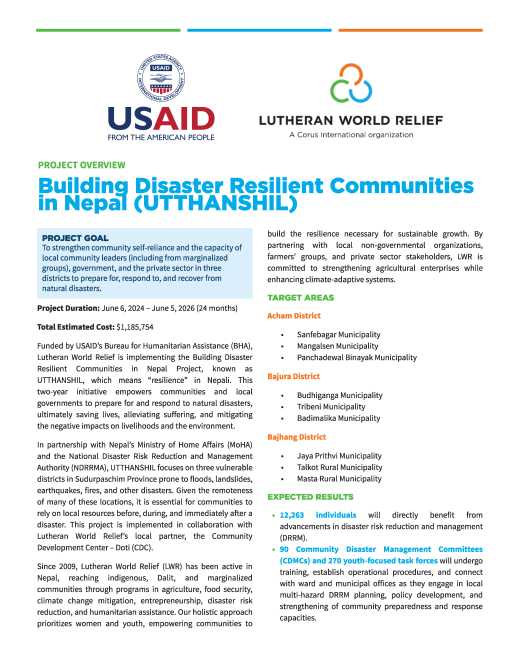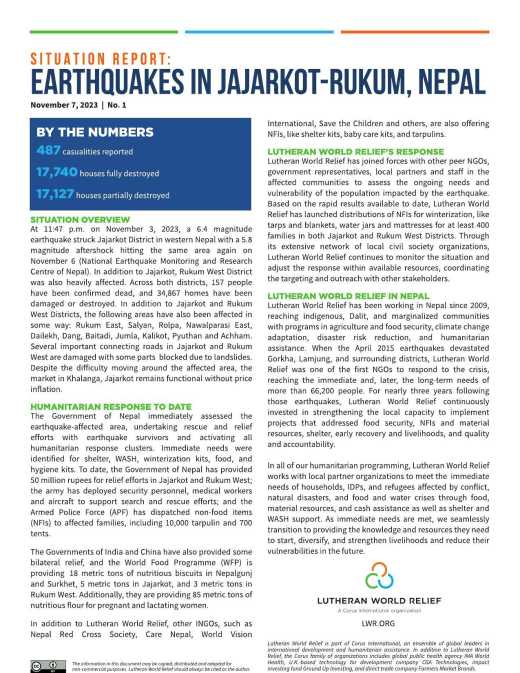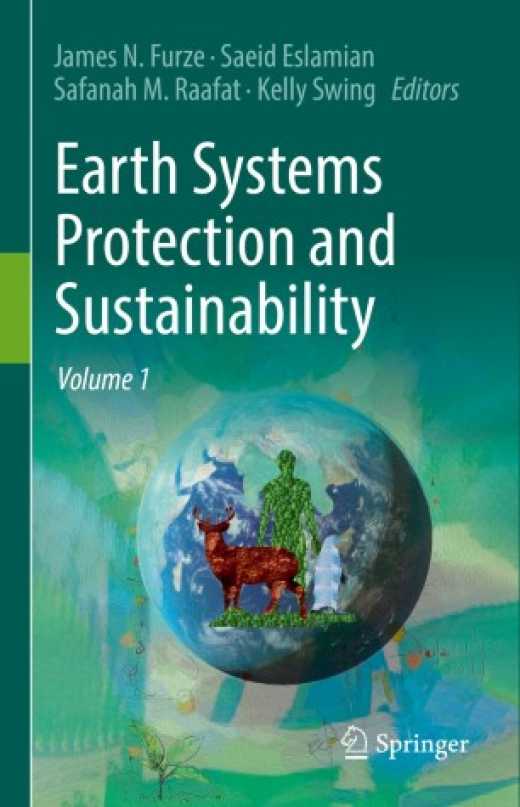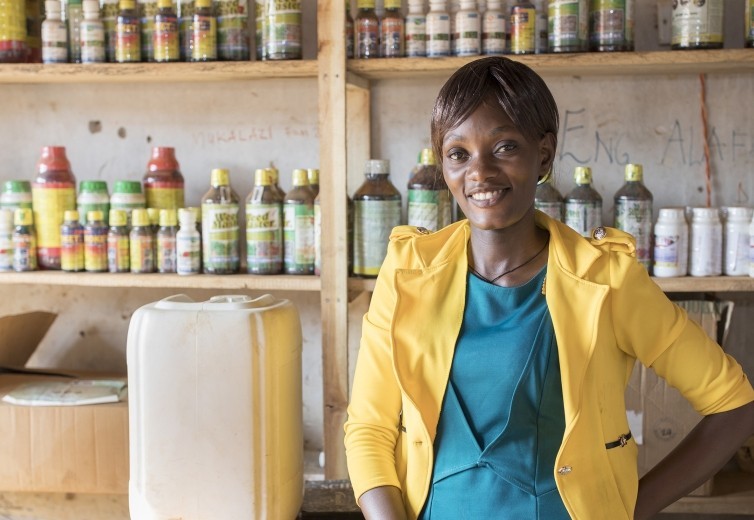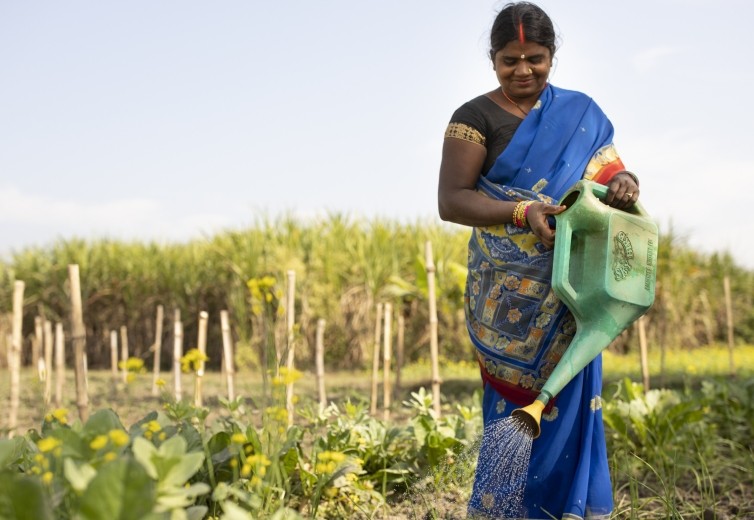Despite recent declines in poverty, Nepal remains one of the poorest countries in the world. Food insecurity, strained water resources and reductions in agricultural production are only a few of the devastating impacts of extreme weather that place millions at risk. Although women account for over half of Nepal’s agriculture workforce, significant barriers remain when it comes to health care, nutrition, education and decision-making. To foster inclusive growth in Nepal, long-term investment is required in rural livelihoods, health systems and disaster risk reduction.
Lutheran World Relief has been working in Nepal since 2009, reaching indigenous, Dalit and marginalized communities with programs in agriculture, food security, entrepreneurship, disaster risk reduction and humanitarian assistance. Our holistic approach prioritizes women and youth and helps communities to build the resilience they need to thrive. By partnering with local non-governmental organizations, farmers’ organizations, and private sector actors, Lutheran World Relief continues to strengthen agricultural enterprises while enhancing adaptive systems.
Project Highlights
LWR partnered with fellow Corus International organization IMA World Health to implement a maternal, newborn and child health (MNCH) project called Baal Swasthya. Utilizing IMA World Health’s expertise in MNCH programming, the project is designed to reduce maternal and child mortality through the improved use of evidence-based practices, enhanced capacity of health institutions and increased community awareness. Implemented in five birthing centers of Nepalgunj Sub Metropolitan City in Banke District, the project focuses on two main objectives: firstly, it seeks to raise community awareness about the accessibility and quality of MNCH services at the local level; and secondly, it aims to strengthen the health system at the ward level to overcome obstacles in providing quality MNCH services at birthing centers. The project expects to reach 1,800 participants directly and 5,000 participants indirectly.
The Youth and Women Entrepreneurship Development project improves the economic prospects of young people and women in Nepal by fostering entrepreneurial skills. The project is centered around three main pillars. Firstly, it aims to either kickstart resilient startups or enhance the profitability of current enterprises. Secondly, it seeks to create opportunities for integration into downstream value chain activities by fostering partnerships with private sector firms. Lastly, it focuses on increasing access to financial services. The project is implemented in four municipalities within Nepal's Kailali and Bardiya Districts through LWR’s local partners, the National Environment and Equity Development Society (NEEDS Nepal) and the Dalit Feminist Upliftment Organization (DAFUO). The project directly benefits 500 participants and indirectly supports 2,500 community members.
A catastrophic earthquake hit Karnali Province on November 3, 2023, claiming the lives of over 157 individuals, leaving hundreds injured, and destroying thousands of homes. In response to the earthquake, LWR provided transitional shelter to 175 vulnerable families and psychosocial services to more than 2,000 impacted community members. The Conrad N. Hilton Foundation funded these efforts that were implemented in partnership with the National Environment and Equity Development Society (NEEDS Nepal).
The Uddhyami project promotes rural enterprises by enhancing economic opportunities and entrepreneurship of youth and women, particularly Dalits and individuals from marginalized communities. The project focuses on improving program participants' knowledge and skills for enterprise development, market assessment, business planning and financial literacy. The project is implemented in Bardiya, Kailali and Kanchanpur Districts through LWR’s local partners, the Backward Society Education (BASE), Community Development Center (CDC) and National Environment and Equity Development Society (NEEDS Nepal).
The project strengthens the entrepreneurial abilities of students in higher secondary education, college attendees and dropouts in Godawari Municipality, Kailali District. The project supports its participants to succeed within the entrepreneurial landscape through strategic interventions that include market-relevant skill building, capacity strengthening, mentorship, and access to business development services and resources. Implemented by LWR’s local partner Youth Alliance for Development (YARD), the project directly benefits 125 participants and indirectly impacts 625 individuals.
The project boosts self-employment and creates job opportunities for youth and women in disaster-prone regions by strengthening disaster-resilient enterprises. By supporting small enterprises led by youth, women, and marginalized groups, the project enhances competitiveness and fosters business relationships with financial institutions. Implemented in the districts of Gorkha, Nawalparasi West, and Saptari, the project targets 600 participants and works closely with the local government, the private sector and institutions of technical education.
LWR implemented the USAID BHA-funded Strengthening Local Governance for Disaster Resilient Communities (SAKSHAM) project to strengthen community resilience through an integrated approach to disaster risk reduction and management (DRRM) and local capacity strengthening. While advancing climate-smart agriculture practices, SAKSHAM impacted nearly 300,000 community members who live in flood-prone districts near the Koshi and Kamala rivers. By supporting livelihoods and financial resilience through cooperatives, community disaster risk management committees (CDMCs), microfinance institutions and insurance programs, LWR strengthened community capacity and advanced the inclusion of women and marginalized groups in DRRM planning. Government capacity was enhanced through localization of emergency operation centers and uptake of the Building Information Platform Against Disaster (BIPAD) portal. SAKSHAM also increased the speed and efficacy of early warning systems through social media and multi-hazard mass sirens.
Through the Transboundary Flood Resilience (TBR) project, LWR and our local partners assisted communities located along the India-Nepal border to strengthen their resilience to the devastating effects of annual flooding. Launched in 2013, TBR organized community members into community disaster risk management committees (CDMCs) as well as into transboundary citizen forums to prepare for and adapt to recurrent flooding by enhancing community capacities on early warning, first aid, search and rescue and rehabilitation services. LWR also advanced community adaptation through climate-smart agriculture practices and livelihoods diversification, including riverbed farming, portable vegetable nurseries, raised nurseries, and hanging vegetable farming. LWR implemented the project through a market systems approach that engaged private sector actors, such as insurance companies, agrovets and seed companies, as well as local cooperatives and savings and loan associations to support rural livelihoods and ensure more robust linkages to local and national government institutions.
LWR improved the uptake of COVID-19 vaccine among rural communities by increasing vaccine demand and providing efficient delivery and equitable access to vaccines in rural areas. In partnership with three local nonprofits, the project was implemented in the Gorkha, Tanahun, Nawalparasi-East, Nawalparasi-West, Saptari, Siraha and Bardiya districts of Nepal.
LWR improved health resilience among vulnerable communities in the Bardiya, Kailali and Kanchanpur districts of Western Nepal. With local partners Dalit Feminist Upliftment Organization (DAFUO), Backward Society Education (BASE) and National Environment & Equity Development Society (NEEDS), LWR strengthened the capacity of health systems to respond to COVID-19, built community resilience to future shocks and worked to restore affected livelihoods.
Working in close partnership with cooperatives, LWR improved the lives of thousands of rural farm families in Nepal by increasing profitability in agricultural value chains and diversifying livelihoods. LWR’s Citrus Market Development project worked in nine rural municipalities in the Gorkha, Nawalparasi and Tanahun districts to support farmers’ citrus cultivation and market access while promoting market growth. The project worked with smallholder farmers and six cooperatives to provide training to improve crop quality, fruit grading, orchard management, collective marketing, product pricing, safe product storage, market linkages and post-harvest handling.
LWR partnered with the private sector to improve inclusive outcomes for marginalized communities through our Yuwa Udhhami (“youth entrepreneurship”) project. The project enabled youth from marginalized communities in Nepal’s Bardiya district to develop entrepreneurial skills and capacity in agriculture-based small and medium enterprises (SMEs). The project targeted ethnic minorities, Dalits and women as it trained youth on the production of high-value crops, provided coaching for business plan development, and created linkages to financial institutions, cooperatives and markets. The promotion of climate-smart farming practices through youth-led agricultural enterprises enhanced ecosystem functioning and led to the adoption of profitable enterprises.
LWR and local partner SAHAMATI partnered on the Mahila Udhhami (“women’s entrepreneurship”) project to empower women in eight rural municipalities in Gorkha, Tanahun and Nawalparasi districts to become successful entrepreneurs. The project improved women’s access to markets and government resources, strengthened fundamental business management and planning skills, improved women’s access to credit, and assisted women to formalize and register their enterprises. Targeting Dalit women, single women, and women who have lost their jobs due to COVID-19, the project not only promoted entrepreneurship within cooperatives to allow for continued mentorship and knowledge transfer but also established market outlet centers for women to sell their goods and to strengthen local networks.
Working through local partner Institute for Social and Environmental Transition - Nepal (ISET), LWR supported urban community resilience in the Kathmandu Valley by improving knowledge and awareness of disaster risk governance, disaster risk financing and disaster risk communication. Working with municipal leaders, we supported the creation of community-based disaster management committees (CDMCs), supported CDMCs with disaster vulnerability and capacity mapping, and strengthened their institutional capacity to manage disaster risks and incorporate disaster risk reduction in risk-sensitive and inclusive municipal planning processes.
LWR’s Improving Resilience through Livelihood Improvement project was implemented in five flood-prone rural municipalities in the Nawalparasi District in Nepal. The project helped farmers to increase crop diversification in the face of a changing climate and environmental degradation. Community-based disaster risk reduction plans were developed, and farmers were trained on flood and drought resistant farming practices, crop diversification, commercialization of higher value commodities (vegetables, bananas, and cereals), and improved access to inputs, storage, and markets.
LWR and Multi-Dimensional Action for Development (MADE) collaborated on the Hamro Sampada (“our natural resources”) project to address various pressures on local forests and biodiversity, including degraded agricultural land, monoculture, overgrazing and lack of knowledge among farmers of climate-smart agricultural practices and biodiversity conservation. The Hamro Sampada project improved the functioning and resilience of the ecosystem in Nepal’s Lamjung and Gorkha district, both of which were heavily affected by the 2015 Nepal earthquake. The project promoted locally appropriate, low-cost and low-maintenance approaches that communities can apply with their existing resources. The project introduces viable non-forest alternative livelihoods and trains community forest user group on forest management, conservation and sustainable grazing practices and payment for ecosystem services.
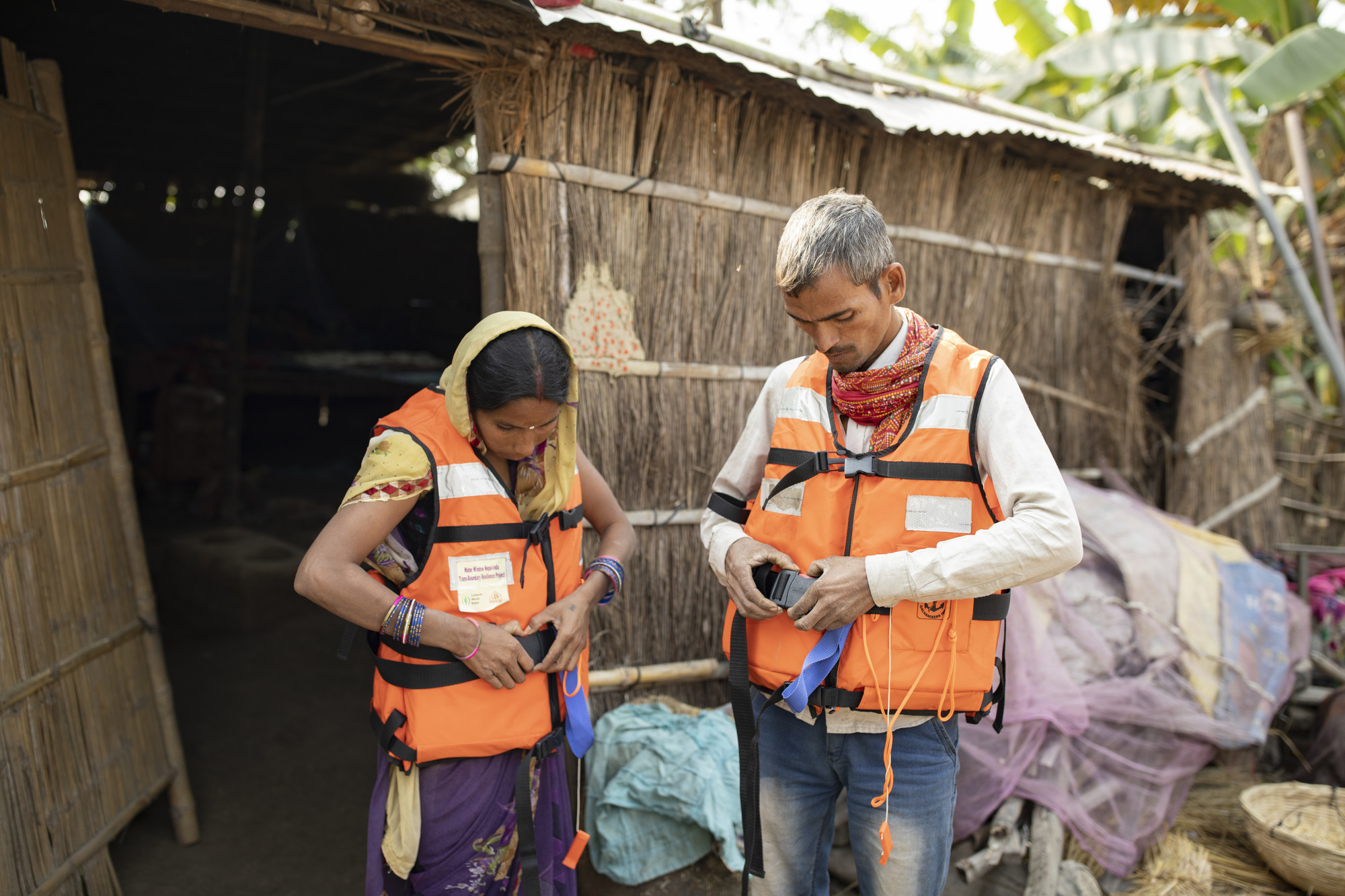
The Corus Effect
Lutheran World Relief is part of Corus International, an international development organization that unites an array of nonprofit organizations and businesses, each with specialized expertise — from health to technology to economic development to emergency response. Alongside communities and local partners in fragile settings, our expert teams integrate disciplines, approaches and resources to overcome poverty and suffering for those living in the world’s toughest and most difficult circumstances. Our traditional and nontraditional approaches bring together the multi-dimensional, holistic solutions needed to truly achieve lasting change.
Corus features global public health leader IMA World Health, international development and aid organization Lutheran World Relief, technology for development consultancy CGA Technologies, impact investing firm Ground Up Investing, and direct-trade company Farmers Market Brands.



